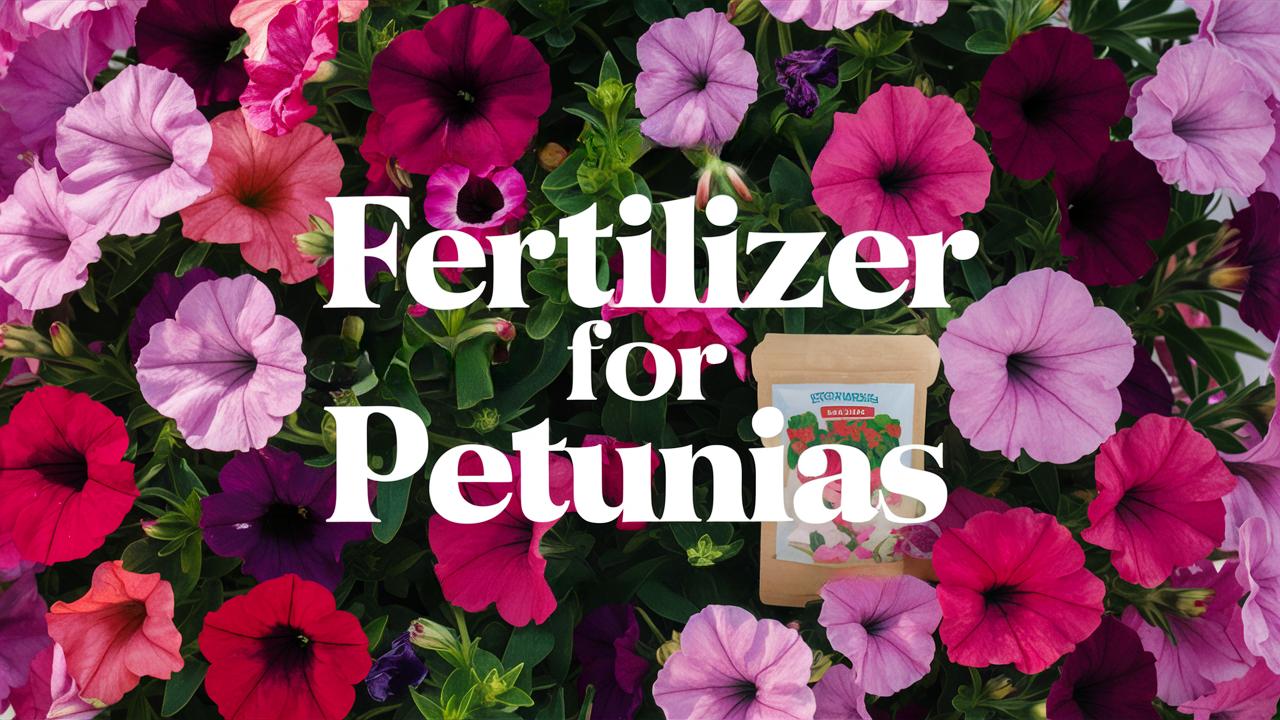In this comprehensive guide, we will explore the various aspects of selecting a fertilizer for petunias, ensuring your gardening endeavors yield beautiful results.
Fertilizer For Petunias
| Image | Name | Rating | Shop |
|---|---|---|---|
 | Petunia FeED |  | |
 | Schultz Slow Release Fertilizer |  | |
 | Palmate Plant Food |  |
Petunia FeED
The Jack’s Classic 20-6-22 Petunia Feed Water-Soluble Fertilizer with Micronutrients is a great choice for petunias as it provides them with the necessary nutrients to produce lush green annuals in any growing condition.
This product offers versatility and convenience, allowing you to feed your petunias through foliar or root application. The powdered concentrate also allows you to mix the right amount of liquid fertilizer at a time, reducing waste. With added micronutrients, additional feeding is not required after initial use. Overall, this product meets all the requirements for optimal growth and health of petunias.
Schultz Slow-Release Bloom Fertilizer
If you’re looking for a fertilizer specifically designed to promote blooming in your petunias, consider the Schultz Spf48270 Slow-Release Bloom Fertilizer.
This product is made with a balanced formula of 12-24-12 NPK nutrients and comes in a convenient 3.5 lb container size. The slow-release design ensures that your petunias will continue to receive essential nutrients over an extended period, without the need for frequent fertilizer applications.
Scotts Super Bloom Water Soluble Plant Food
For petunias that need a boost of nutrients, consider using Scotts Super Bloom Water Soluble Plant Food. This fertilizer is specifically designed to contain high levels of phosphorus which will help promote blooming flowers in your petunias.
This water-soluble plant food can be fed to outdoor flowers like petunias every 1-2 weeks for optimal results. It’s suitable for a variety of uses including outdoor flowers, fruiting plants, containers and bed areas. One thing to note is that it feeds plants instantly, so you don’t have to worry about waiting for the effects to kick in – your petunias will be getting the nutrients they need quickly and effectively.
Osmocote Smart-Release
Osmocote Smart-Release Plant Food Plus Outdoor & Indoor is a great option for fertilizing petunias. This granular fertilizer contains 11 essential nutrients and provides long-lasting nutrient release, feeding plants for up to 6 months.
As it works with virtually all plant varieties and growing conditions, you can rely on Osmocote Smart-Release Plant Food Plus Outdoor & Indoor to give your petunias the nourishment they need. Each granule is coated with a special resin that releases nutrients at the right time for optimal growth. Additionally, this product has a no-burn guarantee when used as directed. With one 2 lb container covering up to 75 sq. ft., it’s a convenient option for larger gardens or multiple petunia plants.
Flower Fuel
For a fertilizer that will help your petunias thrive, we recommend the Bloom Booster and Yield Enhancer for Plants – Big, Heavy, Healthy Harvests. This concentrated phosphorus and potassium formula is specifically designed to promote bigger, denser blooms in multiple gardening systems.
This product, Flower Fuel 1-34-32, has a wide range of applications, from hydroponics to soil-based gardens. Its unique blend of over 40 proprietary ingredients is tailored to support healthy plant growth and boost yields. With the ability to treat up to 200 gallons of water at a cost-effective 10 cents per gallon, Flower Fuel makes for an excellent value fertilizer choice for your petunias.
Miracle-Gro Performance Organics Blooms Plant Nutrition
Miracle-Gro Performance Organics Blooms Plant Nutrition is a good choice for petunias as it’s specifically designed for flowering plants and contains organic ingredients.
It promotes blooming and vibrancy, which can make your petunias stand out with their color. It’s easy to apply using the Miracle-Gro Garden Feeder or a watering can, just feed them every 7 days for best results. With this product you’ll be able to cover around 265 square feet.
Petunia Plant Fertilizer
The Petunia Fertilizer is a straightforward option that should get the job done. It promotes blooming and healthy leaves as expected, which aligns with the general needs of petunias.
This product is available by the bottle in an 8 oz (250mL) size. Those needing something more compact or looking to see if it works for their plants might appreciate this option. The care instructions included are a convenient bonus.
How To Choose a Fertilizer For Petunias
Petunias are among the most beloved annual flowering plants, renowned for their vibrant colors, delightful scents, and ability to flourish in various gardening settings, from containers to garden beds. However, to achieve the best blooms and healthy growth, selecting the right fertilizer is crucial. Fertilizers provide essential nutrients that help petunias thrive, allowing gardeners to create stunning displays.
Understanding Petunia Nutritional Needs
Before diving into the specifics of fertilizers, it’s essential to understand what petunias need nutritionally. Petunias require a balanced supply of macronutrients and micronutrients to grow robustly.
Macronutrients
Nitrogen (N) – This is vital for leaf development and overall plant growth. Nitrogen stimulates the production of chlorophyll, which is crucial for photosynthesis.
Phosphorus (P) – Essential for root development and flowering. Phosphorus supports energy transfer within the plant, promoting strong blooms that petunias are known for.
Potassium (K) – Plays a crucial role in water regulation, disease resistance, and overall plant vigor. Potassium helps petunias withstand stressors, leading to longer-lasting flowers.
Micronutrients
In addition to macronutrients, petunias also require several micronutrients in smaller quantities. Micronutrients include:
Calcium (Ca) – Promotes cell wall strength and overall plant health.
Magnesium (Mg) – Important for chlorophyll production.
Iron (Fe) – Vital for photosynthesis and overall health.
A well-rounded fertilizer will contain these elements in varying ratios to cater to the specific growth stages of petunias.
Types of Fertilizers: Which One is Right for Petunias?
When it comes to fertilizers, they can generally be categorized into two types: granular and liquid. Each has its benefits and appropriate use cases, especially for petunias.
Granular Fertilizers
Granular fertilizers are solid fertilizers that are typically applied to the soil or around the plants. They are slow-releasing and can provide a steady supply of nutrients over time.
Pros:
Longevity: Gradually releases nutrients, reducing the frequency of applications.
Ease of Use: Simple to apply; just sprinkle and water.
Soil Activation: Encourages microbial activity, which can enhance nutrient availability.
Cons:
Initial Nutrient Availability: Nutrients may not be immediately available to the plants.
Risk of Over-Fertilization: If applied too heavily, it can lead to nutrient burn.
Recommended Granular Fertilizers:
Balanced Fertilizer (e.g., 10-10-10): Provides even amounts of nitrogen, phosphorus, and potassium.
Slow-Release Formulations: Ensure a steady supply without the risk of over-fertilizing.
Liquid Fertilizers
Liquid fertilizers are often used as a quick nutrient fix, making them an excellent option for fast-acting support.
Pros:
Immediate Nutrient Uptake: Nutrients are quickly absorbed by the plant, providing almost instant benefits.
Customizable Application: Easier to adjust concentrations based on plant needs.
Cons:
Frequent Application Needed: Typically requires more regular applications than granular fertilizers.
Potential for Burn: Can quickly lead to nutrient burn if applied in excess.
Recommended Liquid Fertilizers:
Water-Soluble Fertilizers (e.g., 20-20-20): Offers a balanced nutrient profile for rapid growth and blooming.
Choosing the Right N-P-K Ratio
One of the most critical aspects in selecting a fertilizer for petunias is understanding the N-P-K ratio, which stands for nitrogen (N), phosphorus (P), and potassium (K). This ratio indicates the percentage of each nutrient in the fertilizer and is crucial for finding a formulation that meets the specific needs of your plants.
Suggested Ratios for Petunias
Fertilizer for Growth Stage:
For Early Growth: 20-10-20. During the initial growth phase, petunias benefit from higher nitrogen to promote lush foliage.
For Flowering Phase: 10-20-10. When buds start forming, switching to a phosphorus-rich fertilizer encourages extensive blooming.
Specialized Formulations: Look for fertilizers specifically formulated for flowering plants, as they often have the right balance of nutrients tailored to enhance blooms.
Timing Your Fertilizer Application
Timing is essential when it comes to fertilizing petunias. Understanding when and how often to apply fertilizer can make a significant difference in plant health and blooming.
Pre-Planting Fertilization
Before planting petunias, consider mixing a slow-release granular fertilizer into the soil. This not only prepares the site for new plants but also ensures that they have access to nutrients as they establish their root systems.
During the Growing Season
First Application: About 4-6 weeks after planting, begin applying liquid fertilizer every two weeks during the growing season. This timing supports the plant’s transition from establishing roots to producing foliage and flowers.
Continuous Feeding: Maintain a regular feeding schedule every 2-4 weeks, depending on the growth phase. Observe plant response and adjust the frequency to align with their health and blooming.
Late Season Care
As the season winds down, reduce fertilization frequency. This allows the plant to transition into a natural dormancy phase and conserves resources for the following year.
Soil Preparation and Type
The type of soil you are using also plays a vital role in how well petunias will uptake nutrients. Understanding soil composition and pH can enhance fertilizer effectiveness and promote robust growth.
Soil Composition
Petunias thrive in well-draining, nutrient-rich soil. Consider using a mix of:
Peat Moss: Helps retain moisture while promoting drainage.
Compost: Replenishes nutrients naturally and supports soil health.
Perlite or Vermiculite: Enhances aeration and drainage, preventing waterlogging.
pH Levels
Petunias prefer slightly acidic to neutral soil, with pH levels between 6.0 and 7.0. Test your soil’s pH using a soil testing kit and amend accordingly. If your soil is too alkaline, you can lower pH by incorporating sulfur or peat moss.
Factors Affecting Fertilizer Needs for Petunias
Several environmental and physiological factors can affect petunia’s nutrient requirements and how they respond to fertilizers.
Light Conditions
Petunias flourish in full sun, requiring at least 6-8 hours of sunlight daily. However, in extremely hot climates, some afternoon shade may help reduce stress on the plants. Fertilization needs may increase under high light conditions due to accelerated growth and flowering.
Watering Practices
Proper watering techniques can influence nutrient uptake. Ensure that your watering practices allow for even moisture without waterlogging but also assess if your pots or beds drain correctly. Water petunias consistently and consider organic mulch to maintain moisture levels and suppress weeds.
Pest and Disease Management
The health of your petunias also influences their fertilizer needs. A plant weakened by pests or diseases may not absorb nutrients efficiently. Regularly check for signs of pests (like aphids or spider mites) and diseases (like powdery mildew) and treat them promptly to maintain plant health.
Organic vs. Synthetic Fertilizers: What’s Best for Petunias?
As a gardener, you might also want to consider whether to use organic or synthetic fertilizers, each of which has its pros and cons.
Organic Fertilizers
Organic fertilizers, derived from natural sources, are often gentler on plants. Options include:
Compost: Rich in nutrients and also improves soil health.
Bone Meal: High in phosphorus, promoting blooming.
Fish Emulsion: Provides a quick nitrogen boost for leafy growth.
Pros:
Soil Health: Enhances the biological activity in the soil.
Less Risk of Burn: Lower concentration of nutrients makes them less likely to cause root burn.
Cons:
Slow Release: Nutrients are typically available over a longer period, which may delay results.
Cost: Sometimes more expensive than synthetic options.
Synthetic Fertilizers
Synthetic fertilizers are chemically formulated and often provide immediate nutrient availability.
Pros:
Speed of Action: Quickly delivers nutrients, which is essential for addressing deficiencies.
Cost-Effective: Generally less expensive than organic options.
Cons:
Soil Degradation: Excessive use can lead to nutrient leaching and soil imbalances.
Potential for Runoff: Can contribute to environmental issues if not applied properly.
Conclusion: Cultivating Beautiful Petunias
Choosing the right fertilizer for your petunias requires a blend of understanding their nutritional needs, selecting the correct type and formulation of fertilizer, maintaining optimal soil conditions, and adjusting for environmental factors. By providing your petunias with balanced nutrients at the right time, you can create an abundance of colorful blooms that brighten your garden space and bring joy to your gardening experience.









